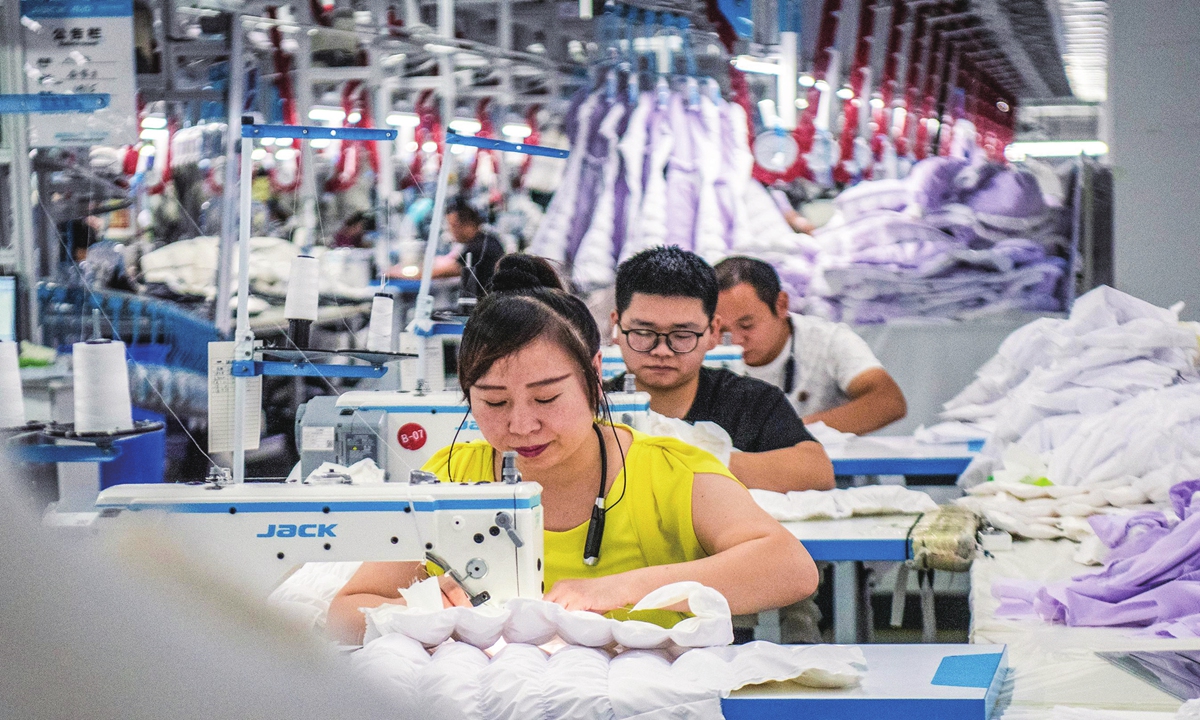
Workers are busy producing export-oriented clothes ordered by overseas clients at a garment factory in Suncun town in Wuhu city, East China's Anhui Province on August 29, 2023. Photo:cnsphoto
France's Parliament on Thursday voted to slow down low-cost "fast fashion," aiming to make products, especially from Chinese mass producers, less attractive to buyers, AFP reported on Friday. Analysts and industry practitioners pointed out that the act could target China's garment and textile supply chain.
The widely-supported bill, which still needs to be approved by the French upper house, also proposes banning advertising by fast fashion companies.
According to French media, Anne-Cecile Violland, deputy of Horizons, the party that submitted the draft law on fast fashion, singled out Chinese company Shein and its "7,200 new clothing items per day" as a prime example of intensive fashion production.
In a statement sent to the Global Times on Friday, Shein said that the company's clothing supply chain is based on precise on-demand production, which can radically reduce waste, and this on-demand flexible supply chain keeps the company's unsold inventory levels in the low single digits, compared to as high as 40 percent for traditional companies.
A Chinese e-commerce industry practitioner, who declined to be named, told the Global Times on Friday that the French bill, in his view, is purely unfair and targets not only Shein but could later be expanded to other Chinese brands and e-commerce platforms such as Temu, given their increasing impact in the world.
"Western fast fashion brands and e-commerce platforms have for years enjoyed the benefits mentioned in the bill. But their damage to the environment, their workforce problems and many other problems were never mentioned," the practitioner said.
He compared the case to Western accusations that China has emitted large amounts of carbon dioxide as it develops. "It is the same routine. The West never mentioned how much carbon dioxide they emitted in the past 200 years since the Industrial Revolution of the 1800s."
The industry practitioner also commented that the French bill is "groundless" and "pure politics."
He said that such a bill, requiring a penalty of up to 10 euros ($11) for each item that e-commerce platforms sell in France by 2030, is similar to the US tariffs imposed on imported Chinese goods, which will ultimately be borne by consumers.
"These politicians only care about their votes rather than lifting the living standards of their people," said the industry practitioner.
According to French media, the popularity of fashion retailers Shein and Temu - which increase their orders based on demand thanks to ultra-flexible supply chains - has disrupted the retail sector, as established players like Zara and H&M continue to rely largely on predicting buyer preferences.
Chinese cross-border e-commerce platforms, such as Shein and Temu, are rapidly rising in the world because of their cheap prices and abundant products, bringing more and more inexpensive Chinese products to consumers around the world, Wang Xin, president of the Shenzhen Cross-Border E-Commerce Association, told the Global Times recently.
"Due to its advantages such as large market scale, efficient logistics payment system and service support, China's cross-border e-commerce platforms quickly attracted global users and sellers," said Wang.
The Chinese apparel and textile industrial and supply chains, represented by brands and e-commerce platforms such as Shein and Temu, and even foreign brands like Primark and Zara, a large number of whose suppliers are located in China, may have had an impact on French enterprises, which may be an important reason for the French proposal, analysts said.
In fact, this is not the first time that France has targeted China's advantageous industries.
In December 2023, France published a list of eligible electric vehicle (EV) models that encouraged customers to favor EVs made in France and Europe over models made in China by offering cash incentives.
However, a third of the incentive would go to consumers who buy Chinese-made EVs due to a lack of cheap European-made electric cars, a French finance ministry official was quoted as saying.




